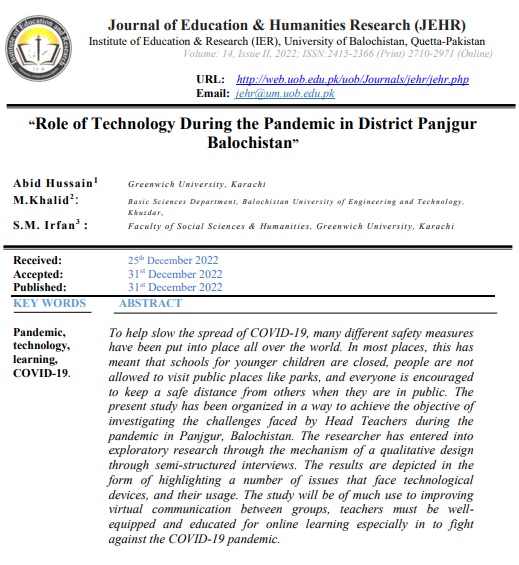Role Of Technology During the Pandemic in District Panjgur Balochistan
Keywords:
Pandemic, technology, learning, COVID-19Abstract
To help slow the spread of COVID-19, many different safety measures have been put into place all over the world. In most places, this has meant that schools for younger children are closed, people are not allowed to visit public places like parks, and everyone is encouraged to keep a safe distance from others when they are in public. The present study has been organized in a way to achieve the objective of investigating the challenges faced by Head Teachers during the pandemic in Panjgur, Balochistan. The researcher has entered into exploratory research through the mechanism of a qualitative design through semi-structured interviews. The results are depicted in the form of highlighting a number of issues that face technological devices, and their usage. The study will be of much use to improving virtual communication between groups, teachers must be well-equipped and educated for online learning especially in to fight against the COVID-19 pandemic.
References
Bagshaw, E. (2016). The Reality is that Technology is Doing More Harm than Good in our Schools’ says Education Chief. North Sydney, NSW: Sydney Morning Herald.
Baek, Y., Jung, J., and Kim, B. (2008). What makes teachers use technology in the classroom? Exploring the factors affecting facilitation of technology with a Korean sample. Comput. Educ. 50, 224–234.
Biagi, F., and Loi, M. (2013). Measuring ICT use and learning outcomes: evidence from recent econometric studies. Eur. J. Educ. 48, 28–42.
Bubb, S., and Jones, M. A. (2020). Learning from the COVID-19 home-schooling experience: listening to pupils, parents/carers and teachers. Improv. Sch. 23, 209–222.
Clark, D. B., Tanner-Smith, E. E., and Killings worth, S. S. (2016). Digital games, design, and learning: a systematic review and meta-analysis. Rev. Educ. Res. 86, 79–122.
Colao, A., Piscitelli, P., Pulimeno, M., Colazzo, S., Miani, A., and Giannini, S. (2020). Rethinking the role of the school after COVID-19. Lancet Public Health 5:e370.
Collins, A., and Halverson, R. (2009). Rethinking Education in the Age of Digital Technology. New York, NY: Teacher’s College Press.
Comi, S. L., Argentin, G., Gui, M., Origo, F., and Pagani, L. (2017). Is it the way they use it? Teachers, ICT and student achievement. Econ. Educ. Rev. 56, 24–39.
Crawford, J., Butler-Henderson, K., Rudolph, J., Malkawi, B., Glowatz, M., Burton, R., et al. (2020). COVID-19: 20 countries’ higher education intra-period digital pedagogy responses. J. Appl. Learn. Teach. 3, 9–28.
De Aldama, C., and Pozo, J. I. (2016). How are ICT use in the classroom? A study of teachers’ beliefs and uses. Electron. J. Res. Educ. Psychol. 14, 253–286.
Dorn, E., Hancock, B., Sarakatsannis, J., and Viruleg, E. (2020). COVID-19 and Learning Loss—Disparities Grow and Students Need Help. Chicago, IL: McKinsey & Company.
Ferdig, R. E., Baumgartner, E., Hartshorne, R., Kaplan-Rakowski, R., and Mouza, C. (2020). Teaching, Technology, and Teacher Education During the COVID-19 Pandemic: Stories from the Field. Waynesville, NC: Association for the Advancement of Computing in Education (AACE).
Buryak, V.V. (2018).Digital economy: breakthrough technologies in education. 7(8): 55-59.
Edwards, 2010 – Edwards, P. (2010). A Vast Machine: Computer Models, Climate Data, and the Politics of Global Warming. Cambridge, MA: MIT Press.
Chekanov, I.R., Neizvestny, S.I. (2019). Experience in the organization of the scientific club of the department of information technologies of Russian state social university "future technologies of digital SOCIETY". Contemporary Problems of Social Work, 5 (1(17)
D'yakova, E.A., Sechkareva, G.G., (2019). Digitalization of education as the basis for training 21st-century teacher: problems and solutions 2: 24-36
Menashy, F., Zakharia, Z. (2019). Private engagement in refugee education and the promise of digital humanitarianism. Oxford review of education.
Vawn Himmelsbach (2019). Pros & Cons of Technology in the Classroom in 2019 Available at;https://tophat.com/blog/6-pros-cons-technologyclassroom/ (Accessed on 02-03-2019).




